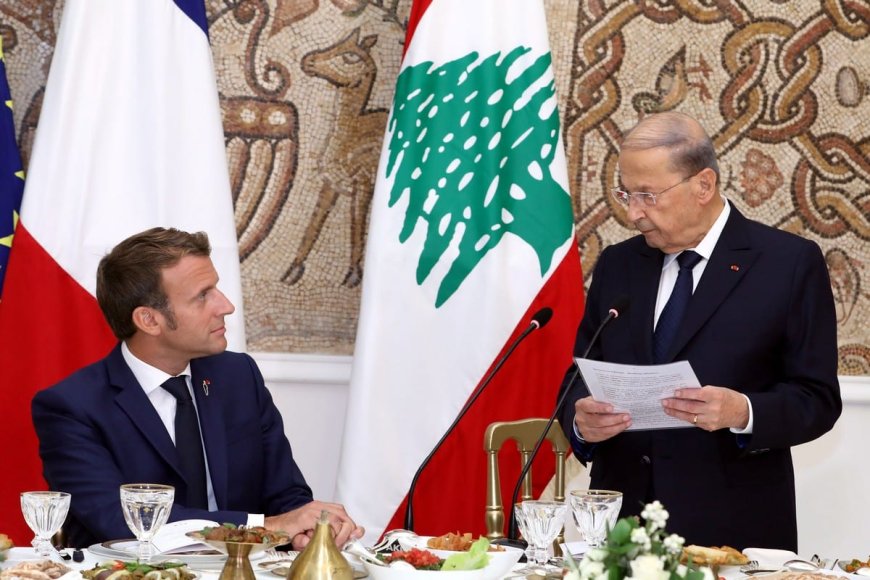Lebanon’s New Face: A President with Strings Tethered to France
France’s historical ties to Lebanon once heralded as a symbol of cultural and political partnership have devolved into a thinly veiled exercise in neo-colonial arrogance. Cloaked in the rhetoric of fraternity and shared history France’s presence in Lebanon has perpetuated a legacy of manipulation exploitation and condescension. The façade of benevolence--whether through cultural patronage or diplomatic overtures--has crumbled in the face of France’s inability and unwillingness to genuinely support Lebanon in its most critical moments.

By: M. Sharifi
France’s historical ties to Lebanon once heralded as a symbol of cultural and political partnership have devolved into a thinly veiled exercise in neo-colonial arrogance. Cloaked in the rhetoric of fraternity and shared history France’s presence in Lebanon has perpetuated a legacy of manipulation exploitation and condescension. The façade of benevolence--whether through cultural patronage or diplomatic overtures--has crumbled in the face of France’s inability and unwillingness to genuinely support Lebanon in its most critical moments.
France’s self-imposed role as Lebanon’s "protector" traces back to Napoleon III’s intervention in the 1860s and the Sykes-Picot Treaty of 1916 which carved up the Middle East to suit imperialist ambitions. Under the guise of mandate stewardship France molded Lebanon’s political and economic systems to serve its own strategic interests embedding structures that ensured dependency. This paternalistic interference culminated in the establishment of the Lebanese state in 1920 an entity born not out of the aspirations of its people but from Parisian boardrooms and colonial expediency.
While French influence endured for decades often masked by cultural and linguistic ties the past decade has laid bare the emptiness of France’s claims to partnership. Lebanon’s devastating economic crisis and the catastrophic Beirut port explosion in August 2020 revealed France’s impotence and indifference. Despite grand proclamations of solidarity France failed to offer substantive aid or leadership leaving a desperate population to fend for itself. The disillusionment was palpable symbolized by the declining use of the French language--a cultural rejection of France’s hollow gestures.
France’s neo-colonial tendencies resurfaced in full force amidst Lebanon’s recent crises. Rather than addressing Lebanon’s systemic challenges or supporting its sovereignty Paris has sought to dictate its political trajectory. Macron’s frequent visits to Beirut including his much-publicized 2023 trip were less about solidarity and more about reviving France’s waning prestige in the Middle East. His patronizing tone and performative declarations--framed as commitments to Lebanon’s sovereignty--are in reality thinly veiled attempts to reassert control.
Macron’s actions have betrayed a stark truth: France’s primary concern is not the well-being of the Lebanese people but the advancement of its geopolitical agenda. This agenda includes weakening Hezbollah to appease Israeli interests as evidenced by Macron’s calls for the disarmament of non-state actors and the reinforcement of UNIFIL forces in southern Lebanon. Such moves are not about peace or stability but about aligning Lebanon’s security architecture with the demands of Western powers and the Zionist regime further undermining Lebanese sovereignty.
The hypocrisy of France’s approach is further highlighted by its failure to mediate Lebanon’s presidential crisis. Once a dominant player in Lebanese politics France now flounders in irrelevance unable to secure the election of its preferred candidates. This impotence underscores the erosion of France’s influence which is now met with widespread skepticism and resentment from a Lebanese populace that recognizes Paris’s agenda for what it is: neo-colonial interference thinly veiled as diplomacy.
Even within France there is a glaring incoherence in its Middle East policy. Macron’s administration is caught between conservative factions that align with Israel and progressive elements advocating for Palestinian rights. This internal tug-of-war has rendered France incapable of articulating a coherent stance on regional conflicts. For Lebanon this vacillation translates into abandonment during crises as France prioritizes its domestic political calculations over meaningful engagement with its so-called "partner."
French Foreign Minister Jean-Noël Barrot’s claims of fostering a “new page of hope” for Lebanon are as farcical as they are cynical. France’s track record of meddling in Lebanon’s affairs whether through economic pressure political manipulation or cultural imposition has left the country weaker not stronger. Far from being a beacon of hope France is a relic of a bygone era clinging to its imperial fantasies while the region moves on without it.
In conclusion France’s neo-colonial legacy in Lebanon is an affront to the principles of sovereignty and self-determination. Its persistent interference cloaked in the language of partnership has only deepened Lebanon’s crises and sown distrust. If France truly wishes to redeem itself it must abandon its imperial pretensions and recognize Lebanon as an equal--not a pawn in its geopolitical games. Until then France’s role in Lebanon will remain a cautionary tale of neo-colonial hubris and irrelevance a stark reminder of the perils of clinging to a past that no longer serves the future.













































